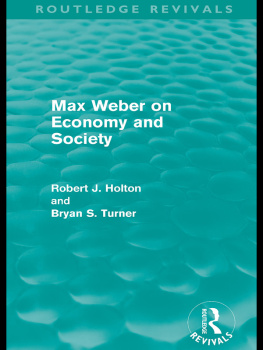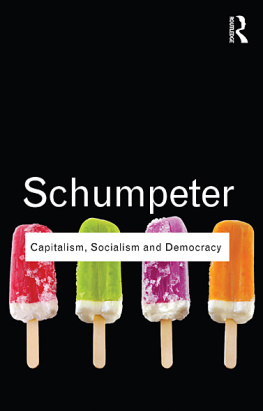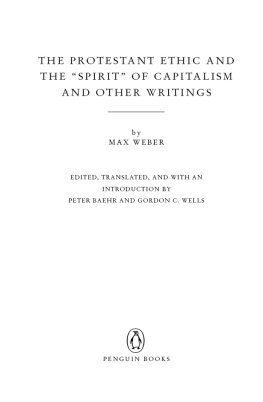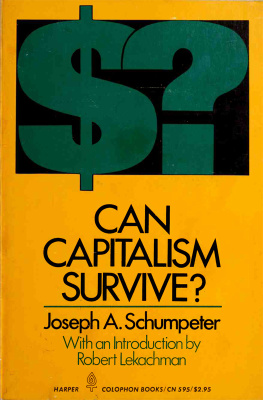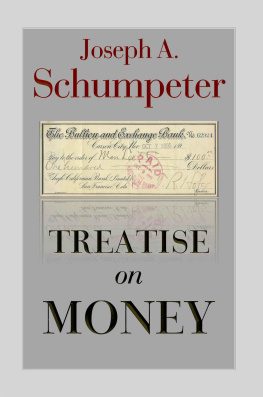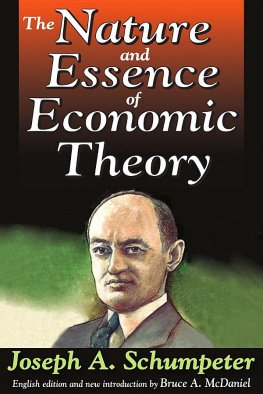Weber, Schumpeter and Modern Capitalism
This book provides the groundwork for a general theory of modern capitalism by reinterpreting Max Webers work on the origins and institutional underpinnings of modern capitalism and Joseph Schumpeters thought on the mechanisms and functioning of the capitalist economy. Focusing on the lesser-known works of both figures, particularly in the case of Weber, whose writings on economics and economic history are frequently overlooked, the author contends that a combination of Schumpeters and Webers theoretical schemas, incorporating their many valuable insights, provides the basis of a unified overall theory of modern capitalism that is comprehensive, coherent and persuasive.
With attention to the important theoretical connections between Weber and Schumpeter and the respective contributions of both with regard to the nature and workings of capitalism, the author explores the compatibility of the two approaches, arguing that the full significance of the contributions of the two writers has not been adequately appreciated.
A systematic and sympathetic comparison and synthesis of the contributions of two of the central figures in social and economic theory, which highlights the enduring relevance of their work in times of political and economic crisis, Weber, Schumpeter and Modern Capitalism will appeal to scholars across the social sciences with interests in social and economic theory, classical sociology and economic history.
John Love was formerly the Ashworth Lecturer in Social Theory at the University of Melbourne, Australia, and is the author of Antiquity and Capitalism: Max Weber and the Sociological Foundations of Roman Civilization (Routledge, 2005). He is currently a practising barrister in Melbourne.
Routledge Studies in Social and Political Thought
For a full list of titles in this series, please visit www.routledge.com/series/RSSPT
117 Elementary Forms of Social Relations
Status, Power and Reference Groups
Theodore D. Kemper
118 Groundwork for the Practice of the Good Life
Politics and Ethics at the Intersection of North Atlantic and African Philosophy
Omedi Ochieng
119 Theories of the Stranger
Debates on Cosmopolitanism, Identity and Cross-Cultural Encounters
Vince Marotta
120 Deciphering Goffman
The structure of his sociological theory revisited
Ramn Vargas Maseda
121 Planet Utopia
Utopia, Dystopia, and Globalisation
Mark Featherstone
122 Weber, Schumpeter and Modern Capitalism
Towards a General Theory
John Love
123 The Cultural Contradictions of Anti-Capitalism
The Liberal Spirit and the Making of Western Radicalism
Daniel Fletcher
124 Peter Berger on Modernization and Modernity
An unvarnished overview
Robert Bickel
125 Imaginaries of Modernity
Politics, Cultures, Tensions
John Rundell
First published 2017
by Routledge
2 Park Square, Milton Park, Abingdon, Oxon OX14 4RN
and by Routledge
711 Third Avenue, New York, NY 10017
Routledge is an imprint of the Taylor & Francis Group, an informa business
2017 John Love
The right of John Love to be identified as author of this work has been asserted by him in accordance with sections 77 and 78 of the Copyright, Designs and Patents Act 1988.
All rights reserved. No part of this book may be reprinted or reproduced or utilised in any form or by any electronic, mechanical, or other means, now known or hereafter invented, including photocopying and recording, or in any information storage or retrieval system, without permission in writing from the publishers.
Trademark notice: Product or corporate names may be trademarks or registered trademarks, and are used only for identification and explanation without intent to infringe.
British Library Cataloguing-in-Publication Data
A catalogue record for this book is available from the British Library
Library of Congress Cataloging-in-Publication Data
A catalog record for this book has been requested
ISBN: 978-1-138-24238-8 (hbk)
ISBN: 978-1-315-27841-4 (ebk)
Typeset in Times New Roman
by Apex CoVantage, LLC
Every effort has been made to contact copyright-holders. Please advise the publisher of any errors or omissions, and these will be corrected in subsequent editions.
Research for the present work was commenced when I was the Ashworth Lecturer in Social Theory at the University of Melbourne. Owing to events at the university, I was obliged to change careers and subsequently became a barrister. I now practise law at the Victorian Bar. While studying to become a lawyer, I continued my keen interest in social theory and completed a PhD at Flinders University in Adelaide. From these studies I developed the ideas that have led to the present book.
Around the time I commenced writing the book, the Soviet Union had just collapsed, and the political and economic systems of the West seemed ascendant and destined to be dominant in the rest of the world. But paradoxically, in the academy the field of social theory remained under the influence of neo-Marxist and other anti-capitalist thinkers Habermas, Offe, Baudrillard, Foucault, Bourdieu, Derrida and others. While the classic writings of figures like Weber and Schumpeter were by no means regarded as insignificant, their theories and methodologies were all too often taken to have been surpassed by later contributions.
I have taken the view that the writings of Weber and Schumpeter on capitalism remain central to the understanding of our current world, despite the changes that have undoubtedly occurred since their day. Their strength lies in the objective, penetrating and unapologetic character of the analyses they contain. In my view, these theoretical contributions are an indispensable means for coming to terms with the realities of the contemporary capitalist world without illusions. Though in recent years there has been something of a renaissance of interest in the work of Weber and Schumpeter, their key socio-economic theories remain under appreciated. I hope the book that follows will remedy this situation and form the basis for a more adequate and comprehensive theory of the modern capitalist system in all its vicissitudes.
I would like to thank my doctoral supervisor, Eduardo de la Fuente, for his support and assistance in regard to my thesis project. I would also like to thank both David Tucker and Harry Redner who read the thesis and provided many useful comments.
I have been fortunate to have had the editorial assistance and understanding of Shannon Knies, Richard Skipper and Kerry Boettcher of Routledge who have helped bring the book to its present state.
Finally, I am indebted to my loving wife Min Juan Dai who gave me invaluable support from the beginning of the project and continues to inspire me.


